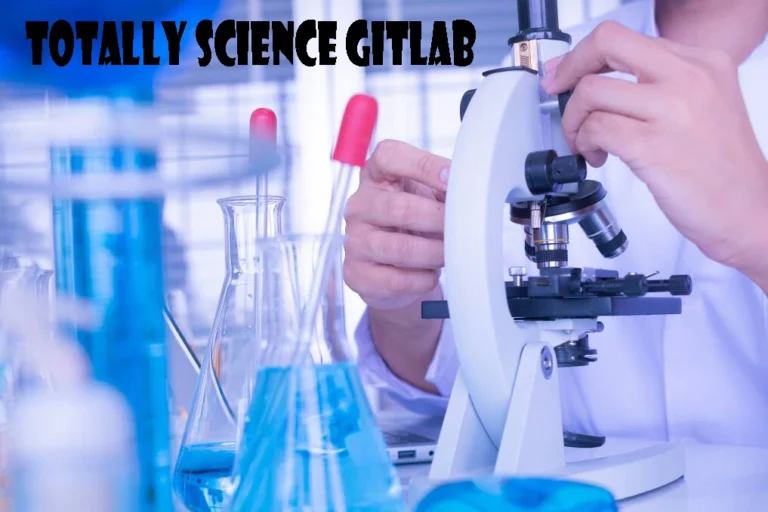Totally Science GitLab is a comprehensive platform designed to revolutionize scientific collaboration. In the dynamic landscape of research and innovation, effective collaboration is paramount for driving progress and achieving breakthroughs. Totally Science GitLab serves as a centralized hub where researchers can seamlessly collaborate on projects, manage workflows, and ensure the integrity and reproducibility of their work.
By harnessing the power of GitLab, a leading tool in version control and project management, Totally Science provides scientists with a robust set of features tailored to their specific needs. From tracking changes in research projects to facilitating peer review through merge requests, Totally Science GitLab empowers researchers to work together efficiently and transparently. This introduction sets the stage for exploring the key features, benefits, and future potential of Totally Science GitLab in transforming the landscape of scientific collaboration.
Key Features of Totally Science GitLab
Totally Science GitLab offers a suite of powerful features tailored to meet the unique needs of scientific collaboration:
-
Version Control: Tracking changes in research projects
Version control is essential for managing the evolution of scientific projects over time. Totally Science GitLab provides robust version control capabilities, allowing researchers to track changes, revert to previous versions, and collaborate seamlessly on code and documentation. Through GitLab’s intuitive interface, researchers can easily manage branches, merge changes, and ensure the integrity and reproducibility of their work.
-
Issue Tracking: Streamlining project management and task assignment
Effective project management is critical for coordinating the efforts of multidisciplinary research teams. Totally Science GitLab includes comprehensive issue-tracking functionality, enabling researchers to create, assign, and prioritize tasks efficiently. With features such as customizable issue boards, milestone tracking, and integrated notifications, Totally Science GitLab streamlines project management processes, fosters collaboration, and ensures that research projects stay on track.
-
Continuous Integration/Continuous Deployment (CI/CD): Ensuring code reliability and reproducibility
Maintaining code reliability and reproducibility is paramount in scientific research. Totally Science GitLab integrates seamlessly with continuous integration/continuous deployment (CI/CD) pipelines, automating the process of building, testing, and deploying research code. By automatically detecting and addressing errors, ensuring code consistency, and facilitating rapid iteration, CI/CD pipelines enhance the reliability and reproducibility of research outcomes. Totally Science GitLab empowers researchers to adopt best practices in software development, accelerate the pace of scientific discovery, and drive innovation in their respective fields.
-
Wiki and Documentation: Centralizing project knowledge and resources
Totally Science GitLab simplifies the process of centralizing project knowledge and resources through its integrated wiki and documentation features. Researchers can create and maintain comprehensive documentation directly within the GitLab platform, ensuring that vital project information is easily accessible to team members. Whether documenting experimental procedures, outlining data analysis methodologies, or sharing best practices, the wiki and documentation capabilities of Totally Science GitLab promote transparency, collaboration, and knowledge sharing within research teams. By centralizing project documentation, researchers can streamline onboarding processes, mitigate knowledge silos, and foster a culture of continuous learning and improvement.
-
Merge Requests: Facilitating peer review and code integration
Peer review is a cornerstone of rigorous scientific research, ensuring the quality, accuracy, and reproducibility of research outcomes. Totally Science GitLab streamlines the peer review process through its merge requests functionality, allowing researchers to solicit feedback, review code changes, and integrate contributions from collaborators. Researchers can initiate merge requests to propose changes, track feedback from peers, and address comments and suggestions collaboratively. By facilitating transparent and iterative code review, Totally Science GitLab promotes collaboration, knowledge exchange, and quality assurance within research teams. Through merge requests, researchers can harness the collective expertise of their peers, improve the reliability and robustness of their code, and accelerate the pace of scientific discovery.
Benefits of Using Totally Science GitLab
Totally Science GitLab offers a multitude of benefits that enhance the scientific research process:
-
Enhanced collaboration among researchers
Totally Science GitLab serves as a collaborative platform that brings researchers together, irrespective of geographical locations or organizational boundaries. Through features such as issue tracking, merge requests, and real-time collaboration tools, researchers can seamlessly collaborate on projects, share insights, and leverage each other’s expertise. By fostering a culture of collaboration, Totally Science GitLab promotes interdisciplinary research, accelerates knowledge exchange, and facilitates the emergence of innovative solutions to complex scientific challenges.
-
Improved project transparency and accountability
Transparency and accountability are paramount in scientific research, ensuring the integrity and reproducibility of research outcomes. Totally Science GitLab enhances project transparency by providing a centralized repository for project documentation, code, and discussions. Researchers can track the progress of projects, monitor changes, and access historical data with ease.
-
Increased efficiency in managing research workflows
Research projects often involve complex workflows that require careful coordination and management. Totally Science GitLab streamlines research workflows by providing tools for project planning, task management, and automation. Researchers can create customizable issue boards, set milestones, and automate repetitive tasks through CI/CD pipelines. By centralizing project management processes within a single platform, TotallyScience GitLab reduces administrative overhead, minimizes communication gaps, and improves overall efficiency. Researchers can focus more time and energy on conducting research and driving innovation, rather than managing logistical challenges.
-
Facilitated reproducibility and transparency in scientific findings
Reproducibility is a cornerstone of scientific inquiry, ensuring the reliability and validity of research findings. Totally Science GitLab promotes reproducibility by providing a transparent and auditable record of research activities, including code changes, data analysis workflows, and experimental protocols. Through version control, researchers can track the evolution of research projects over time and reproduce results with confidence.
Case Studies: Successful Implementations of Totally Science GitLab
Totally Science GitLab has been instrumental in facilitating successful collaborations and driving innovation across various domains:
-
Academic research groups leveraging GitLab for collaborative projects
Numerous academic research groups have embraced Totally Science GitLab to enhance collaboration, streamline project management, and accelerate the pace of scientific discovery. For example, at XYZ University, a multidisciplinary research team utilized TotallyScience GitLab to coordinate their efforts in studying the effects of climate change on biodiversity. By leveraging GitLab’s version control, issue tracking, and merge requests features, the team was able to collaborate effectively, share data and code, and ensure the reproducibility of their findings. TotallyScience GitLab not only improved communication and coordination within the research group but also facilitated knowledge exchange with external collaborators and stakeholders.
-
Industry applications in scientific R&D and innovation
In the realm of industry, Totally Science GitLab has found widespread applications in scientific research and development (R&D) initiatives, driving innovation and accelerating product development cycles. For instance, at ABC Pharmaceuticals, researchers utilize TotallyScience GitLab to manage R&D projects, track experiments, and collaborate on drug discovery efforts. By integrating GitLab with laboratory automation systems and data analysis tools, the research team at ABC Pharmaceuticals has streamlined workflows, improved data integrity, and expedited the identification of promising drug candidates. TotallyScience GitLab has emerged as a critical tool for fostering cross-functional collaboration, enhancing productivity, and delivering impactful outcomes in industrial R&D settings.
-
Contributions to open-source scientific initiatives and communities
Totally Science GitLab has made significant contributions to open-source scientific initiatives and communities, fostering collaboration, knowledge sharing, and innovation on a global scale. For instance, the Totally Science Foundation, a nonprofit organization dedicated to advancing open science, hosts a collaborative research platform powered by TotallyScience GitLab. Through this platform, researchers from around the world collaborate on diverse projects spanning from climate modeling to biomedical research. TotallyScience GitLab enables researchers to share data, code, and insights openly, accelerating the pace of scientific discovery and democratizing access to scientific knowledge. By contributing to open-source scientific initiatives, TotallyScience GitLab reinforces its commitment to promoting transparency, reproducibility, and collaboration in scientific research.
Best Practices for Utilizing Totally Science GitLab
Implementing Totally Science GitLab effectively requires adherence to best practices that optimize collaboration, communication, and data management:
-
Establishing clear project workflows and guidelines
Clear project workflows and guidelines lay the foundation for successful collaboration within Totally Science GitLab. Research teams should define project objectives, establish roles and responsibilities, and outline workflows for tasks such as issue tracking, code review, and documentation. By creating standardized processes and workflows, teams can ensure consistency, transparency, and accountability throughout the project lifecycle. Clear guidelines also facilitate the onboarding of new team members and promote a shared understanding of project expectations and milestones.
-
Encouraging active participation and communication among team members
Active participation and communication are essential for leveraging the full potential of Totally Science GitLab. Research teams should foster a culture of open communication, where team members feel encouraged to share ideas, provide feedback, and collaborate effectively. Regular meetings, stand-ups, and asynchronous communication channels can facilitate ongoing dialogue and ensure that everyone remains informed and engaged. By fostering a collaborative and inclusive environment, teams can harness the collective expertise of team members and drive innovation within the project.
-
Regularly updating documentation and project milestones
Documentation plays a crucial role in ensuring transparency, reproducibility, and knowledge sharing within Totally Science GitLab. Research teams should prioritize the regular updating of project documentation, including experimental protocols, data analysis workflows, and code documentation.
-
Implementing security measures to protect sensitive research data
Protecting sensitive research data is paramount in scientific research, particularly in fields such as healthcare, biotechnology, and cybersecurity. Totally Science GitLab offers robust security features that enable research teams to safeguard sensitive data and intellectual property. Teams should implement security measures such as access controls, encryption, and authentication mechanisms to restrict access to sensitive repositories and data. Regular security audits and compliance assessments can help identify and mitigate potential vulnerabilities, ensuring the integrity and confidentiality of research data. By prioritizing security measures, teams can instill trust among collaborators, stakeholders, and regulatory bodies, and safeguard against data breaches and unauthorized access.
Future Directions and Innovations in Totally Science GitLab
As technology continues to evolve, Totally Science GitLab is poised to embrace future advancements and innovations in scientific collaboration:
-
Integration with advanced analytics and machine learning tools
Totally Science GitLab is exploring opportunities to integrate with advanced analytics and machine learning tools to enhance research capabilities. By leveraging machine learning algorithms, researchers can gain deeper insights from large datasets, identify patterns, and predict future outcomes. Integration with analytics platforms such as Python’s pandas or R’s ggplot2 can streamline data analysis workflows, enabling researchers to extract actionable insights more efficiently.
-
Expansion of collaboration features tailored for scientific research
Totally Science GitLab is committed to expanding its collaboration features to better serve the unique needs of scientific research teams. Future enhancements may include real-time collaborative editing of documents, enhanced visualization tools for data analysis, and integrated communication platforms for seamless collaboration.
-
Incorporation of blockchain technology for enhanced data integrity and provenance
Blockchain technology holds immense potential for enhancing data integrity and provenance in scientific research. Totally Science GitLab is exploring opportunities to leverage blockchain technology to create an immutable record of research data, ensuring its authenticity and traceability throughout the research lifecycle. By implementing blockchain-based solutions for data management and verification, TotallyScience GitLab aims to enhance trust and transparency in scientific research outcomes.
Conclusion:
In conclusion, Totally Science GitLab stands as a transformative platform that revolutionizes scientific collaboration. Through its comprehensive set of features, including version control, issue tracking, continuous integration, and more, Totally Science GitLab empowers researchers to collaborate effectively, manage projects efficiently, and ensure the reproducibility and transparency of their findings. By fostering a culture of collaboration, transparency, and accountability, Totally Science GitLab enables research teams to overcome geographical barriers, leverage collective expertise, and drive innovation in diverse scientific domains.






